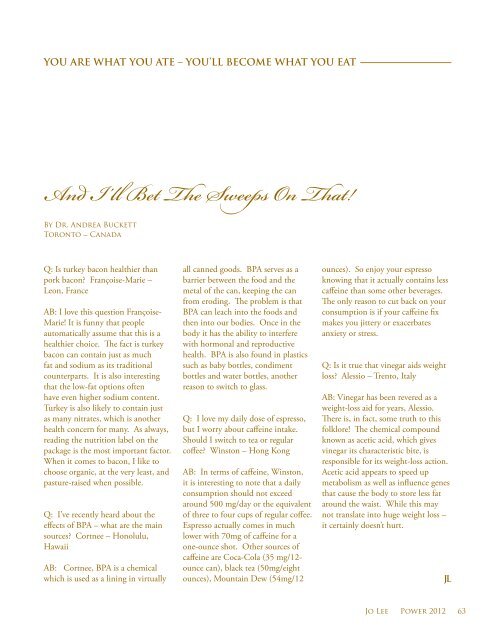Power Issue 2012 Jo Lee - JO LEE Magazine
Power Issue 2012 Jo Lee - JO LEE Magazine
Power Issue 2012 Jo Lee - JO LEE Magazine
You also want an ePaper? Increase the reach of your titles
YUMPU automatically turns print PDFs into web optimized ePapers that Google loves.
YOU ARE WHAT YOU ATE – YOU’LL BECOME WHAT YOU EAT<br />
And I ’ll Bet The Sweeps On That!<br />
By Dr. Andrea Buckett<br />
Toronto – Canada<br />
Q: Is turkey bacon healthier than<br />
pork bacon? Françoise-Marie –<br />
Leon, France<br />
AB: I love this question Françoise-<br />
Marie! It is funny that people<br />
automatically assume that this is a<br />
healthier choice. The fact is turkey<br />
bacon can contain just as much<br />
fat and sodium as its traditional<br />
counterparts. It is also interesting<br />
that the low-fat options often<br />
have even higher sodium content.<br />
Turkey is also likely to contain just<br />
as many nitrates, which is another<br />
health concern for many. As always,<br />
reading the nutrition label on the<br />
package is the most important factor.<br />
When it comes to bacon, I like to<br />
choose organic, at the very least, and<br />
pasture-raised when possible.<br />
Q: I’ve recently heard about the<br />
effects of BPA – what are the main<br />
sources? Cortnee – Honolulu,<br />
Hawaii<br />
AB: Cortnee, BPA is a chemical<br />
which is used as a lining in virtually<br />
all canned goods. BPA serves as a<br />
barrier between the food and the<br />
metal of the can, keeping the can<br />
from eroding. The problem is that<br />
BPA can leach into the foods and<br />
then into our bodies. Once in the<br />
body it has the ability to interfere<br />
with hormonal and reproductive<br />
health. BPA is also found in plastics<br />
such as baby bottles, condiment<br />
bottles and water bottles, another<br />
reason to switch to glass.<br />
Q: I love my daily dose of espresso,<br />
but I worry about caffeine intake.<br />
Should I switch to tea or regular<br />
coffee? Winston – Hong Kong<br />
AB: In terms of caffeine, Winston,<br />
it is interesting to note that a daily<br />
consumption should not exceed<br />
around 500 mg/day or the equivalent<br />
of three to four cups of regular coffee.<br />
Espresso actually comes in much<br />
lower with 70mg of caffeine for a<br />
one-ounce shot. Other sources of<br />
caffeine are Coca-Cola (35 mg/12ounce<br />
can), black tea (50mg/eight<br />
ounces), Mountain Dew (54mg/12<br />
ounces). So enjoy your espresso<br />
knowing that it actually contains less<br />
caffeine than some other beverages.<br />
The only reason to cut back on your<br />
consumption is if your caffeine fix<br />
makes you jittery or exacerbates<br />
anxiety or stress.<br />
Q: Is it true that vinegar aids weight<br />
loss? Alessio – Trento, Italy<br />
AB: Vinegar has been revered as a<br />
weight-loss aid for years, Alessio.<br />
There is, in fact, some truth to this<br />
folklore! The chemical compound<br />
known as acetic acid, which gives<br />
vinegar its characteristic bite, is<br />
responsible for its weight-loss action.<br />
Acetic acid appears to speed up<br />
metabolism as well as influence genes<br />
that cause the body to store less fat<br />
around the waist. While this may<br />
not translate into huge weight loss –<br />
it certainly doesn’t hurt.<br />
JL<br />
<strong>Jo</strong> <strong>Lee</strong> <strong>Power</strong> <strong>2012</strong> 63

















